- Home
- David Liss
The Coffee Trader Page 5
The Coffee Trader Read online
Page 5
Then she began to tell Annetje secrets, like how she had, unbeknownst to her husband, gone to see the witch woman who lived outside of town for a charm that would help her get with child. She told her about Daniel’s quirks and foibles and coolness. For example, he would never, under any circumstances, take off all his clothing. She told Annetje how after he used his chamber pot he would return, hour after hour, to sniff at it.
And she told the girl other things too, things she now wished she could take back. Even as she’d said them, she knew she had confided too much. Maybe that was even why she’d done it. The thrill of speaking the forbidden, of asking for help in doing what must not be done—it had been all too delicious. And it would most likely be her undoing.
“We’ll go tomorrow?” Annetje asked now, as though she sensed Hannah’s thoughts.
“Yes,” Hannah said. These furtive trips had been exhilarating at first. Warm and welcoming, but also exciting in the way forbidden things always were. Now it was a terrible duty, one she could not avoid without seeing a little sparkle in the maid’s eyes, a sparkle that said Do as I instruct or I’ll tell your husband what you would not want him to know. She’d only uttered the threat aloud once, when she’d been very angry at Hannah for not wanting to give her more than the secret ten guilders a week above what her husband paid her. That one time had been enough. Now she only hinted. “I’d hate to say things best left unsaid,” she would tell her mistress, or “I fear sometimes that my tongue is too loose, and if your husband is around—well, we’d best not talk of that.”
Hannah looked again at the dull knife. In Lisbon she might have been tempted—truly tempted—to plunge it into the girl’s heart and be done with her. Who would have asked questions if a kitchen girl died in the home of a rich merchant? In Amsterdam, though, with its leveling politics and merchant culture, a housewife would hardly get away with killing a servant. Not that Hannah could really bring herself to murder another human being, no matter how much she might hate her. Still, it was better to have the option.
Daniel’s teeth were bothering him today. She could see that when they sat down for dinner. He had fingers from both hands in his mouth and was fishing around for who knew what. He would do that at night too, digging for hours on end, paying no mind to where his elbow flew or whom it struck.
After months of this she had urged him to see a surgeon—a tricky business, since Daniel took great offense if she suggested anything to him. If his hand were on fire and she suggested that he dunk it in a bucket of water, he’d glare at her and let himself burn. To soften the advice, she’d given it in anecdotal form: “Jeronimo Javeza’s wife tells me her husband had a problem tooth pulled by a skilled dentist who works near the Damrak. She says he hasn’t been so comfortable in five years.”
So Daniel had gone but come back with the same troubling teeth with which he’d left the house that morning. “The brute of a surgeon wanted fifteen guilders to pull five teeth,” he’d said. “Three guilders a tooth. For fifteen guilders, a man should get new teeth, not lose old ones.”
Now, at the table, Daniel looked almost ready to aid his excavation with a knife while Miguel blessed the wine. Miguel prayed over everything they ate, over anything that didn’t move. He might pray over his own turds, for all she knew. When Daniel ate alone with her, he would mutter the Hebrew words or mutter some of them if he couldn’t remember the rest. Often he forgot to pray at all. He would always forget when he ate alone, there being no one to impress or instruct. Miguel, however, would bless his food whenever he ate. She’d seen other men of the Vlooyenburg with their Hebrew and their blessings, and often they seemed to her angry or frightening or alien. With Miguel there was delight in his utterances, as though he were remembering something wonderful each time he said the prayers. It was hard not to hear these strange words anew each time he spoke them—not mumbled and swallowed, the way some men did, but clearly articulated, like oratory. She heard the poetry of a foreign tongue, its cadences and repetitions complementary sounds. And she knew things would be different if Miguel, instead of Daniel, were her husband.
This wasn’t just some idle fancy born from her constant reflection that Miguel was far more handsome and robust than his brother. Where Daniel was thin and looked like a beggar in merchant’s clothes, Miguel was round and pink and hearty. Though Miguel was the elder brother, he looked more youthful and healthy. His large black eyes always darted here and there, not nervously like Daniel’s, but with delight and wonder. And his face was so round—delicate and somehow still strong. What would it be like, she wondered, to be married to a man who loved laughter instead of resenting it, who embraced life instead of squinting at it with suspicion?
That was fate’s little irony. She knew her father had been seeking an alliance with the Lienzos and wanted his daughter to marry the elder son. Hannah had never met either or them, so it was all one to her, but then the elder son had upped and married a penniless girl without his family’s approval, so her father had opted for the next Lienzo in line. By the time Miguel’s wife died, only four months later, Hannah was already married to Daniel.
What would these prayers mean to her if she had married Miguel? Daniel knew almost nothing of the liturgy. He went to synagogue because the parnassim expected it of him, particularly his friend Solomon Parido (whom Hannah was inclined to dislike because of his sour attitude toward Miguel). He had often enough spared her the tedium of going herself, but now that he had got her with child, he made her come along so the men of the congregation could be reminded of his virility. More than one had wished him a son so he might have someone to say kaddish for him when he died.
He had not even spoken in private to Hannah of Jewish worship until they began their preparations to move to Amsterdam. Her father and three brothers had all been devoted Secret Jews, but no one had told her so before her marriage. On the eve of her wedding, when she was but sixteen years old, her father had explained that because her mother was renowned throughout the land for her loose tongue, he had assumed that Hannah would have the same streak of womanly treachery and had decided not to entrust the truth to his daughter. For the good of the family she had been allowed to think of herself as a Catholic, worship as a Catholic, and hate Jews as a Catholic. Now, as she prepared to marry this stranger who had been selected without even asking her opinion (he had dined with her family twice and, her father had pointed out, Hannah had politely returned his awkwardly tight-lipped smiles that looked like the grimace of a man in pain), her father had chosen to reveal to her the family secret.
The secret: she was not the person she had always been led to believe she was; even her name had been a lie. “You are not truly Bernarda,” he told her. “You are Hannah, which is also the true name of your mother. You must call yourself Hannah from this moment on, but not in public, for that would betray us all, and I hope you are not so stupid as to do that.”
How could she be a Jew? Was it possible that she was of the race of child-killers and well-poisoners? Surely her father had made some mistake that her husband would clarify, so she had merely nodded and tried not to think too much about it.
But how could she not think about it? Her father had kept her own name from her, and now she had to practice strange rituals, which he explained rapidly and impatiently, assuring her that her new husband would clarify any foolish questions she might be imprudent enough to ask. She never asked and it would be years before he explained. Later she heard strange stories: that only the circumcised can enter the Kingdom of Heaven (did that mean women were forever banned from their eternal reward?); that only flattened bread should be eaten in springtime; that blood must be drained from meat before it can be eaten.
Her father, on the eve of her wedding, had cared nothing for Hannah’s knowledge or for her ability to keep the laws—only her tongue. “I suppose your silence will now be your husband’s problem,” he had said, “but if the Inquisition should take you, I hope you’ll have the good sense to betray his family rather
than your own.”
Hannah sometimes regretted that she had never had the opportunity to betray either.
She could tell at once that the meal would go badly. Annetje spilled some of the flan on the table and almost dropped a steaming heap of it into Daniel’s lap.
“Learn to conduct yourself, girl,” Daniel snapped, in his nearly incomprehensible Dutch.
“Learn how to put your lips to my plump ass,” Annetje answered.
“What?” Daniel demanded. “What did the girl say? I can’t understand a word of her garbled accent.”
It was true enough that she spoke in the odd manner of Dutch northerners—and exaggerated the accent when she spoke impertinently—but Daniel only used that as an excuse for barely knowing the tongue of a land in which he had lived for more than two years. He had no idea what she’d said, but he saw Miguel’s stifled laugh, and that was enough to set the mood.
Miguel, who Hannah was sure had put his own lips to all sorts of places on Annetje’s anatomy, tried to avert discomfort by praising the food and the wine, but there was no appealing to his host’s pride.
“I’ve heard,” Daniel said, “that you’re to lose a great deal in the brandy trade.”
Daniel had never shown warm feelings for his brother. There had always been a rivalry between them. She knew that when they were boys their father had told them that Lienzo brothers had never gotten along, not since their great-great-grandfather had killed their great-great-great-uncle in an argument over a tavern bill. When he saw the boys playing happily together, he would remind them of this tradition. Miguel wanted only to avoid his brother whenever possible, but Daniel believed in a more aggressive approach, and he had grown even more acrimonious in recent months. Perhaps Daniel had been embarrassed by Miguel’s difficulties in trade, perhaps he regretted having loaned his brother so large a sum, and perhaps it had something to do with his friendship with Solomon Parido.
Hannah did not entirely understand the relationship between her husband and the parnass, but it had formed almost from the instant they arrived in Amsterdam. A member of the community always looked after new arrivals (Daniel had been asked to do this but had refused, saying it was well known that refugees always brought strange smells into an established household), and Parido had been the one to look after Daniel. Within a few months they had begun working together, as Parido mined Daniel’s Portuguese contacts to trade mostly in wines, but also in figs and salt and olives and sometimes dried lemons. In that first year, she had overheard a conversation—really, quite by accident—in which Daniel lamented already having a wife, and thus far a barren wife too, since Parido’s daughter was of a marriageable age and an alliance between them would be the most beneficial thing in the world. That was how they had begun to think of linking the family through Miguel.
If that marriage had gone through as planned, perhaps feelings between brothers would have softened, but things went horribly badly. Not that Hannah minded. She had disliked the girl and thought Miguel might do better. But the disaster had left Daniel feeling he could speak to his brother any way he liked, a feeling only intensified by Miguel’s losses in the sugar market.
Miguel, however, at least maintained the appearance of calm. As his brother harassed him about his brandy futures, he only took a sip of his wine and half smiled. “Reckoning day has not yet come. We’ll see how things stand then.”
“As I hear it, you’ll stand another thousand or more in debt.”
Daniel had loaned Miguel fifteen hundred guilders when his affairs soured, and while Daniel never referred to the loan directly, he knew a hundred ways to refer to it obliquely.
Miguel attempted the same half smile but said nothing more.
“And what is this I hear,” Daniel pressed on, “about the coffee trade?”
Miguel kept his smirk, but at once it seemed to turn waxy and false, as though he had tasted bitter meat and needed someplace discreet to spit it out.
“What makes you think I have an interest in the coffee trade?” he asked.
“Because when you came home last night, you woke me by clattering drunkenly around the house and muttering about coffee.”
“I have no recollection of doing so,” Miguel answered, “but I suppose that is the nature of drunken mutterings—one never recollects them.”
“What is your interest in coffee?”
“No interest. I was feeling overly wet in my humors, so I took a prescription of coffee to dry myself out. I was most likely merely marveling at its curative powers.”
“I cannot recommend that you enter into the coffee trade,” Daniel said.
“I have no plans to do so.”
“I think you will find it a less hospitable commodity than you might imagine. After all, it is only a medicine used by a few apothecaries, prescribed by a few physicians. What advantage could you find in trading in so unwanted a thing?”
“I’m sure you’re right.”
“Trading in something no one wants can only lead to more ruin.”
Miguel set down his glass of wine too hard, and a few drops rose up to splash him in the face. “Are you deaf?” He wiped away the wine from his eye. “Are your ears in your teeth? Have you not heard that I have no interest in the coffee trade?”
“I only wish to make myself clear,” Daniel said sulkily, as he pushed his food around his plate, waiting for it to reach the same temperature as the interior of his mouth so he could eat it without difficulty.
“However,” Miguel added after a moment, “your resolve makes me curious. Why should a man, whoever he might be, fear to involve himself in the coffee trade?”
But now it was Daniel who wanted to speak no more of it.
They ate the rest of the meal mostly in silence, Daniel staring at his food, Miguel exchanging glances with Hannah when he felt he could do so without her husband noticing. If he ever contemplated that he might well have been married to her, he never showed any signs of it, but he was always kind. Miguel was rarely home except to sleep in his damp cellar, so there were few occasions for them to talk without her husband’s presence, but on those occasions he spoke to her warmly, as though they were old friends, as though he valued her opinion.
One time she had even dared to ask him why he slept in the cellar. When he had first moved in, Daniel had placed him in a small windowless room on the third floor—what the Dutch called the priest room—but Miguel had complained that it was too hot and smoky if he burned peat and too cold if he did not. Hannah suspected he’d moved out for other reasons. The priest room was located directly under the room in which she and Daniel slept, and on Saturday mornings, after she and her husband had observed the tradition of conjugal duties (one of the few rules of the Hebrews Daniel showed any interest in adhering to—at least until she had become pregnant), Miguel always seemed embarrassed and uncomfortable.
So now he lived in the damp cellar, sleeping in a cupboard bed that even the shortest man would have to curl up to fit into. At night, when the tides rose, the canal water spilled through the windows and onto the floor, but he still preferred it to the priest room, at least when he wasn’t creeping up the stairs to Annetje’s garret chamber.
At the conclusion of the cheerless meal, they were rescued from their misery by a pounding at the door. It turned out to be the parnass, Senhor Parido, who entered the room and bowed in his overly formal way. Like Daniel, Parido dressed like a Portuguese man, and while Hannah had grown up thinking nothing of men who wore bright colors and giant hats, in Amsterdam such clothes appeared to her slightly ridiculous. At least Parido went to a decent tailor, and his suits of reds and golds and bright blues somehow looked more appropriate on him than on her husband. Parido had wide shoulders and a muscular frame, a rugged face with dull eyes.
He radiated a melancholy that Hannah had never fully understood until the day she’d seen him on the street, leading his only son by the hand. The boy was her age but addled in his head and hooted like a monkey she’d once seen in a traveli
ng show. Parido had no other sons, and his wife was too old to bear more.
Parido’s sadness meant nothing to Daniel. Hannah would have been surprised if he had even noticed it. Daniel saw only the enormity of Parido’s house, the expense of his clothes, the wealth that he gave to the charitable boards. Parido was one of the few men in the city, Jew or gentile, who owned a coach, and he maintained his own horses in a stable on the fringes of the city. Unlike in Lisbon, horse travel was not generally permitted in Amsterdam, and each venture had to be approved by an office in the Town Hall. And even though the coach had little practical use, Daniel envied its shiny gilding, the padded seats, the envious looks of the pedestrians they passed. That was what Daniel wanted. The envy. He wanted to be the object of everyone’s envy, and he had not the first idea how to go about it.
Daniel greeted the parnass in the most elaborate terms imaginable. He nearly fell over, getting up from the table so he could return the bow. He then told Hannah that he and Senhor Parido would withdraw to the front room. The maid should bring them some wine—a bottle of his best Portuguese—and then she should get out before she offered any of her tongue.
“Perhaps the elder Senhor Lienzo would like to join us,” Parido suggested. He stroked his beard, which he kept fashionably short and slightly pointy, like a painter’s rendition of his namesake.
Miguel looked up from the last of his stewed herring. He had barely responded with a nod to Parido’s bow. Now Miguel continued to stare as if he didn’t understand his Portuguese.
“I’m sure my brother has other things to do with his time,” Daniel suggested.
“It does seem likely,” Miguel agreed.
“Please, why don’t you join us?” Parido suggested again, an unusual softness in his voice. Miguel could not refuse unless he wished to risk utter rudeness.

 The Whiskey Rebels
The Whiskey Rebels Renegades
Renegades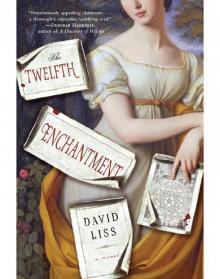 The Twelfth Enchantment: A Novel
The Twelfth Enchantment: A Novel The Day of Atonement
The Day of Atonement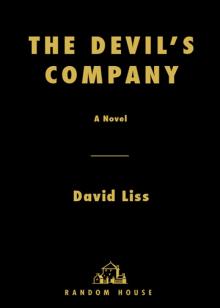 The Devil's Company
The Devil's Company Randoms
Randoms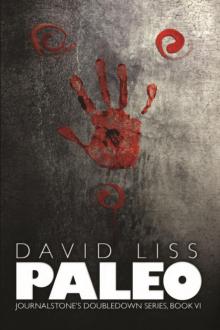 Paleo / The Doomsday Prepper
Paleo / The Doomsday Prepper Rebels
Rebels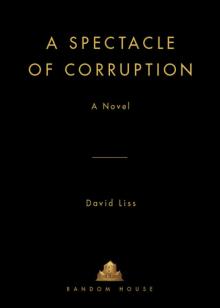 A Spectacle of Corruption
A Spectacle of Corruption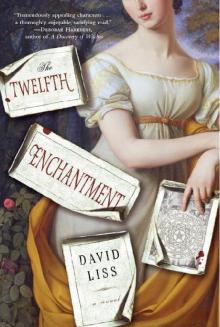 The Twelfth Enchantment
The Twelfth Enchantment The Coffee Trader
The Coffee Trader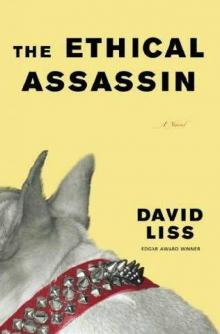 The Ethical Assassin
The Ethical Assassin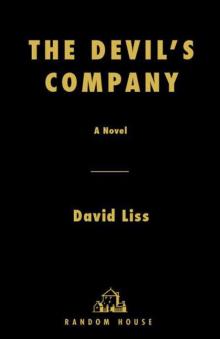 The Devil’s Company: A Novel
The Devil’s Company: A Novel The Double Dealer
The Double Dealer The Whiskey Rebel
The Whiskey Rebel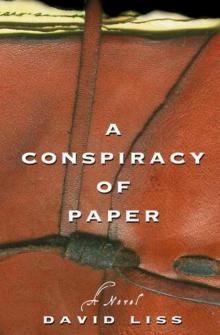 A Conspiracy of Paper bw-1
A Conspiracy of Paper bw-1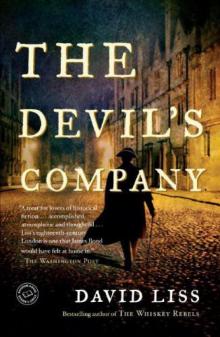 The Devil's Company bw-3
The Devil's Company bw-3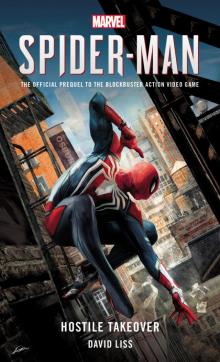 Marvel's SPIDER-MAN
Marvel's SPIDER-MAN